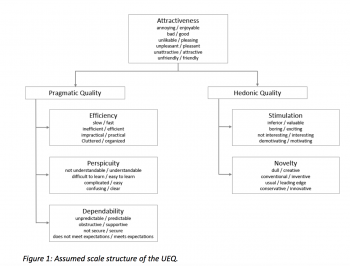Usability and UX Questionnaires
Please describe the different Usability and UX Questionnaires in terms of
- Name of the questionnaire
- Source / Weblink / Publication
- Administration, Procedure (paper, online, time needed, post-hoc)
- Structure (e.g. number of items, constructs)
- Quality (e.g. Reliability, Validity, Intrusiveness etc.)
Contents
AttrakDiff
IsoNorm
Isometrics
Group 4 is checking this.
Source / Weblink / Publication:
file:///Users/valeriafugazza/Downloads/ISOMetrics_S.pdf
Gediga, Günther & Hamborg, Kai-Christoph & Duntsch,. (1999). The IsoMetrics Usability Inventory. An operationalisation of ISO 9241-10 supporting summative and formative evaluation of software systems. Behaviour and Information Technology. 18. 151-164. 10.1080/014492999119057.
Administration, Procedure (paper, online, time needed, post-hoc):
The Isometrics test is performed online
-The mean time to perform this test is 1.5 hours (long version)
-The mean time to perform this test is 30 minutes (short version)
Structure (e.g. number of items, constructs):
-The number of items is 75 with an additional weighting and open answers with examples (long version)
-The number of items is 35 by just using Likert-like questions (short version)
-IsoMetrics contains a five point rating for each of the items starting from one (`predominantly disagree’) to (`predominantly agree’) including (`no opinion’)
-Seven scores of the usability dimension to measure the progress of development
-Concrete information about malfunctions and their user-perceived attributes
-Mean weight of any user-perceived attribute given a class of system malfunctions.
Quality (e.g. Reliability, Validity, Intrusiveness etc.)
-It is deemed a valuable and reliable tool
System Usability Scale (SUS)
- Source / Weblink / Publication
- Administration, Procedure (paper, online, time needed, post-hoc)
- Structure (e.g. number of items, constructs)
- Quality (e.g. Reliability, Validity, Intrusiveness etc.)
User Experience Questionnaire (UEQ)
The scales of the questionnaire cover a comprehensive impression of user experience. Both classical usability aspects (efficiency, perspicuity, dependability) and user experience aspects (originality, stimulation) are measured.
Source / Weblink / Publication
- You can download the questionnaire for free on this website: https://www.ueq-online.org/
- published by the UEQ Team
Administration, Procedure (paper, online, time needed, post-hoc)
- questionnaire to evaluate a product based on contrasting attributes on a 7-point-scale
- accessible as a PDF download or as an online questionnaire
- either filled out online or on paper
- Full version and short version available
- Time needed for full version approx. 5-10 minutes
Structure (e.g. number of items, constructs)
The UEQ Full Version contains 6 scales with 26 items (https://www.ueq-online.org/Material/Handbook.pdf):
- Attractiveness: Overall impression of the product. Do users like or dislike the product?
- Perspicuity: Is it easy to get familiar with the product? Is it easy to learn how to use the product?
- Efficiency: Can users solve their tasks without unnecessary effort?
- Dependability: Does the user feel in control of the interaction?
- Stimulation: Is it exciting and motivating to use the product?
- Novelty: Is the product innovative and creative? Does the product catch the interest of users?
Short version: 8 items 3-5 Minutes
Quality (e.g. Reliability, Validity, Intrusiveness etc.)
- gives idea about the perception of different characteristics of a product
- good construct validity, measured with Cronbach's Alpha
- not intrusive
Software Usability Measurement Inventory (SUMI)
Usability Metric For User Experience (UMUX)
Group 2 is doing this :)
